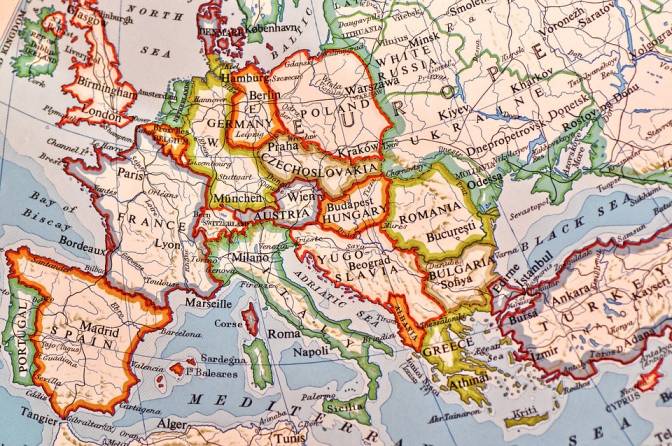
If you’re interested in acquiring citizenship in another country or are just curious about the criteria for obtaining second citizenship, read on to learn more about the countries with birthright citizenship. This article will look at the requirements to acquire a second passport through birthright citizenship, and the differences between citizenship by jus soli (right of soil) and citizenship by jus sanguinis (right of blood).
We’ll also discuss the benefits of dual citizenship and other means of acquiring second citizenship.
What is birthright citizenship?
In most cases, a child acquires citizenship automatically at birth, but some countries enforce specific requirements or conditions.
Jus soli vs Jus sanguinis
Jus soli defines nationality or the right to acquire citizenship through being born within a country or territory, while jus sanguinis determines citizenship as being inherited from parental blood relatives. In most cases, blood relatives refer to one genetic or gestational parent. It can also mean one or both parents or legal parents by law, such as adoptive parents.
Besides citizenship of a country, a person can also automatically acquire citizenship from national identities of ethnic, cultural, or other origins, such as an Aboriginal tribe or Native Americans.
Determining birthright citizenship
Jus soli
Governments determine Jus soli in two ways:
Unrestricted birthright citizenship: Children born in the country’s territory are automatically citizens.
Restricted birthright citizenship: In addition to being born in the country’s territory, the person must also meet conditions such as:
- At least one parent must have been born in the country
- Must have two citizen parents
- At least one parent must have been physically present in the country for a year before birth.
- The father must have been born in the country
- Must have a citizen mother
Jus sanguinis
Jus sanguinis can apply to a person born on foreign soil. It can be as simple as one parent born in the country’s territory, but like jus soli, most countries granting citizenship at birth have different requirements, which could be:
- Both parents were born in the country
- One parent was born in the country and has a current residence permit
- A member of the paternal side must be or have been a citizen
- Parents in a legal marriage and physically present in the country for a specific number of years
Other determinations
In almost all cases, persons born abroad to foreign diplomats or other government employees on active duty will acquire their parent’s citizenship.
Rare cases also exist where a Supreme Court decision grants birthright citizenship on clear and convincing evidence of extenuating circumstances. This can be a stateless child due to unknown or stateless parents or a child born abroad who has a legal parent through adoption.
For the most part, most countries will offer birthright citizenship to children who are born stateless. So for simplicity’s sake, we’ll focus on the most common forms of birthright citizenship.
Pros and Cons
Pros
-
It’s faster and easier to claim citizenship by birth than through naturalization.
- It allows a baby born abroad to foreign parents to become a citizen without going through lengthy and complicated processes of naturalization themselves.
- It gives people a sense of belonging to a particular nation and a strong sense of identity.
- It helps to preserve cultural ties and ensures that people without strong ties to their country of origin can become citizens.
- It entitles people to the rights and privileges of a citizen, such as voting rights and access to government services.
- It usually makes obtaining a passport and traveling to other countries easier.
Cons
- Persons born abroad who acquire citizenship status in this way may not have a strong connection to their country of origin and may not feel very patriotic.
- Persons born abroad may not be familiar with their country’s customs and traditions, making many feel alienated.
- It can result in discrimination against those without certain ancestors and create difficulties for people who have moved away from their birthplace or have parents of different nationalities.
- They may not have access to certain benefits available to naturalized citizens, such as financial assistance from the government.
Citizenship by Birthright of Children
Unrestricted birthright citizenship (jus soli)
The following countries have no restrictions on birthright citizenship, except for children born to diplomats.
A notable difference is Costa Rica, where it doesn’t apply to a baby born of a government employee. It also requires registration with the Costa Rican government before the age of 25.
Country | Status | Conditions |
Antigua and Barbuda | Unrestricted (jus soli) | Except for children born to diplomats. |
Argentina | Unrestricted (jus soli) | Except for children born to diplomats. |
Barbados | Unrestricted (jus soli) | Except for children born to diplomats. |
Belize | Unrestricted (jus soli) | Except for children born to diplomats. |
Canada | Unrestricted (jus soli) | Except for children born to diplomats. |
Chad | Unrestricted (jus soli) | Except for children born to diplomats. |
Chile | Unrestricted (jus soli) | Excludes children of civil servants and transient foreigners. |
Costa Rica | Unrestricted (jus soli) | Doesn’t apply to a baby born of a government employee. |
Cuba | Unrestricted (jus soli) | Except for children born to diplomats. |
Dominica | Unrestricted (jus soli) | Except for children born to diplomats. |
Ecuador | Unrestricted (jus soli) | Except for children born to diplomats. |
Grenada | Unrestricted (jus soli) | Except for children born to diplomats. |
Guatemala | Unrestricted (jus soli) | Except for children born to diplomats. |
Guyana | Unrestricted (jus soli) | Except for children born to diplomats. |
Honduras | Unrestricted (jus soli) | Except for children born to diplomats. |
Jamaica | Unrestricted (jus soli) | Except for children born to diplomats. |
Mexico | Unrestricted (jus soli) | Except for children born to diplomats. |
Nicaragua | Unrestricted (jus soli) | Except for children born to diplomats. |
Panama | Unrestricted (jus soli) | Except for children born to diplomats. |
Paraguay | Unrestricted (jus soli) | Except for children born to diplomats. |
Peru | Unrestricted (jus soli) | Except for children born to diplomats. |
Saint Lucia | Unrestricted (jus soli) | Except for children born to diplomats. |
Saint Vincent and the Grenadines | Unrestricted (jus soli) | Except for children born to diplomats. |
Tanzania | Unrestricted (jus soli) | Except for children born to diplomats. |
Trinidad and Tobago | Unrestricted (jus soli) | Except for children born to diplomats. |
Tuvalu | Unrestricted (jus soli) | Except for children born to diplomats. |
United States | Unrestricted (jus soli) | Except for children born to diplomats. |
Uruguay | Unrestricted (jus soli) | Except for children born to diplomats. |
Venezuela | Unrestricted (jus soli) | Except for children born to diplomats. |
Restricted birthright citizenship (jus soli)
The following countries automatically grant birthright citizenship, with restrictions:
Country | Status | Restrictions |
Australia | Restricted | Requires a child's mother or father to have been a citizen or permanent resident or the child to have lived the first ten years in Australia. |
Bahrain | Restricted | Excludes a child born of a father who was not born in Bahrain and doesn’t hold permanent residency. |
Cambodia | Restricted | Excludes children born of parents who are not legal residents. |
Colombia | Restricted | Excludes children born without a citizen mother or citizen father. |
Dominican Republic | Restricted | Excludes children born without a citizen mother or citizen father. |
Egypt | Restricted | Excludes children whose mother or father was not born in the country. |
Fiji | Restricted | Excludes children if either parent isn’t a citizen. |
France | Restricted | * See details below |
Germany | Restricted | * See details below |
Greece | Restricted | * See details below |
India | Restricted | Requires one parent to have been born in India and the other parent to have been born in India or have a permanent residence permit. |
Iran | Restricted | Excludes a child born of a mother or father who was not born in Iran. |
Ireland | Restricted | * See details below |
Israel | Restricted | Excludes a child born of a mother or father who was not born in Israel. |
Japan | Restricted | Excludes children born to non-citizen parents. |
Luxembourg | Restricted | * See details below |
Malaysia | Restricted | Excludes a child if either the mother or father is not a citizen or permanent resident. |
Malta | Restricted | * See details below |
Mongolia | Restricted | Excludes children born of parents who are not legal residents. |
Morocco | Restricted | Excludes children whose mother or father was not born in the country |
Namibia | Restricted | Excludes children whose parents are not citizens or permanent residents of the country |
New Zealand | Restricted | Excludes children if either parent isn’t a citizen or legal resident. |
Pakistan | Restricted | Excludes a child born to refugees. |
Portugal | Restricted | * See details below |
South Africa | Restricted | Exclude children whose parents are not citizens or permanent residents of the country |
Spain | Restricted | * See details below |
Sudan | Restricted | Excludes children whose mother or father was not born in the country |
Taiwan | Restricted | Excludes children born to non-citizen parents. |
Thailand | Restricted | Requires a child's mother or father to be a permanent resident and domiciled in the country for five years. |
United Kingdom | Restricted | * See details below |
European Citizenship by Birth

Citizenship acquisition is mostly straightforward for babies born in the country’s territory to parents born there or a parent’s naturalization. In other cases, applicants may need to fulfill various conditions for birthright citizenship eligibility, which differs from country to country.
European countries enforce a restricted citizenship by birth rule based on jus soli (right of soil) and jus sanguinis (right of blood). So to know which country in Europe gives citizenship at birth for specific criteria would require referring to the country’s nationality act.
Here is a list of the birthright citizenship countries in Europe and the requirements to obtain it:
 Belgium
Belgium
You can obtain birthright citizenship in Belgium if:
- At least one parent was born in Belgium
- At least one parent had lived in Belgium for ten years
- At 18 years old, no other citizenship since birth
- At least one parent was born in Belgium and had lived there for five years before birth
 Cyprus
Cyprus
You can obtain birthright citizenship in Cyprus if:
- At least one parent was born in Cyprus or is a Cypriot citizen
 France
France
You can obtain birthright citizenship in France if:
- Born in France, and one or both parents were born in French territory
- 18 years old, and was born in France before 1 January 1994
- Born in France to parents born before independence in a former French sovereign colony/territory
- Born in France on or after 1 January 1994
- 18 years old and was physically present in France for a continuous period of at least five years since age 11
- Between 16 and 18 years old, was physically present in France for a continuous period of at least five years since age 11
- Between 13 and 16 years old and has been physically present in France since eight years old
 Germany
Germany
You can obtain birthright citizenship in Germany if:
- Born in Germany and at least one married parent is a German national
- One parent was a German citizen at the time of birth
- Born after 1 January 2000, and one or both parents were physically present in Germany for at least eight years with indefinite leave to remain
 Greece
Greece
You can obtain birthright citizenship in Greece if:
- One parent is a Greek citizen
- Born in Greece, and at least one parent has been a valid resident in Greece for five years since birth
- Both parents have been legal residents in Greece for five years, and the child completes elementary education (six years)
 Finland
Finland
You can obtain birthright citizenship in Finland if:
- The mother is a Finnish citizen and was at birth.
- The father is a Finnish citizen and in a marriage to the mother
 Ireland
Ireland
You can obtain birthright citizenship in Ireland if:
- Born in Ireland before 1 January 2005
- Born in Ireland, and the mother or father is an Irish citizen, a British national, a resident with indefinite leave to remain, or a resident who has been physically present in Ireland for at least three of the preceding four years
- One parent is an Irish citizen and was born in Ireland
 Italy
Italy
You can obtain birthright citizenship in Italy if:
- 18 years old and has been permanently domiciled in Italy since birth
- 21 or older and was permanently domiciled in Italy for at least three years since 18 years old
- A paternal descendant was an Italian citizen
- Born after 1 January 1948 and a maternal descendant was an Italian citizen
 Luxembourg
Luxembourg
You can obtain birthright citizenship in Luxembourg if:
- One parent was born in Luxembourg
- One parent is a Luxembourg citizen
- 18 years old, and both parents were physically present in Luxembourg in the 12 months preceding birth
- 18 years old and has lived continuously in Luxembourg for the five years preceding their 18th birthday
 Portugal
Portugal
You can obtain birthright citizenship in Portugal if:
- One of the parents is a Portuguese citizen
- One parent resided in Portugal as a lawful resident for at least one year before birth
 Spain
Spain
You can obtain birthright citizenship in Spain if:
- One parent is a Spanish citizen
 Sweden
Sweden
Birthright citizenship can be obtained in Sweden if:
- Born after 1 April 2015, and at least one parent is a Swedish citizen
- Born before 1 April 2015 and the child’s father was a Swedish citizen and was married to the mother
- Born in Sweden before 1 April 2015 and the father was a Swedish citizen
- Born after 1 July 1979 and before 1 April 2015 and the child’s mother was a Swedish citizen
 Malta
Malta
Birthright citizenship can be obtained in Malta if:
- One parent was born in Malta or is a Maltese citizen
- Born in Malta after 25 September 1964 and before 1 August 2000
 United Kingdom
United Kingdom
Birthright citizenship can be obtained in Malta if:
- Born after 31 December 1982 and before 1 July 2006 and the mother was a British citizen or legal resident
- Born after 31 December 1982 and before 1 July 2006, and the father was a British citizen or lawful resident and was married to the mother
- Ten years old and has not spent more than 90 days outside the country since birth
- Born after 1 July 2006, and the mother was a British national or legal resident
US Birthright Citizenship

The phrase “subject to the jurisdiction” was a key element of the 14th Amendment, and it has been interpreted in various ways over the years. It was intended to exclude foreign ministers and their offspring, as well as Native American tribes, who owed obedience to their own nations. This exception, however, does not extend to children of foreign ministers, diplomats, or other officials who owe their allegiance to a foreign nation.
The Trump administration, during its time in office, proposed the idea of denying citizenship to children born to illegal aliens, a policy that generated heated debates. However, this proposal faced significant legal challenges, and many argued that it went against the long-standing common law rule and the principles enshrined in the 14th Amendment. While there have been arguments in favor of redefining the interpretation of the amendment, the Supreme Court’s decision on this matter is of paramount importance.
It is important to note that birthright citizenship has been a crucial topic, not just in the US, but in many countries around the world. The concept itself has evolved over time, with special provisions being extended to certain groups, like those born in outlying possessions or territories. Additionally, derivative citizenship allows children born outside the country to become citizens if their parents are citizens. This can be a complex matter, often requiring legal counsel and documentation.
In recent times, there has been renewed debate over the issue of birthright citizenship, with arguments from conservatives suggesting a reevaluation of the existing laws. The topic remains a significant point of discussion, with proposals to alter or even abolish birthright citizenship. However, any such changes would require careful consideration and potential amendments to the constitution, making it a difficult and contentious process.
In summary, birthright citizenship, as a legal practice, has been deeply ingrained in the history and identity of many nations. It ensures that individuals, regardless of their parentage or immigration status, are granted citizenship by virtue of their birth within a particular country. The interpretation and application of this principle have evolved over time, and it continues to be a topic of great importance and debate, particularly in the United States. The foundational nature of birthright citizenship and its implications for individuals and the nation as a whole make it a subject of ongoing legal, political, and societal consideration.
Alternative Methods for Citizenship
You’ve read the list of some of the countries that provide citizenship at birth and what they require to grant it, but if you don’t have a claim to birthright citizenship, there are several alternative methods of acquiring a second or multiple citizenships.
By naturalization

Many people ask, “If my child is born in the USA can I get a green card”? The answer is yes, providing you meet certain eligibility requirements. You can apply for US citizenship after maintaining a lawful permanent residence for five years.
Receiving lawful permanent residence in Europe long enough to acquire citizenship can be challenging. It often takes a long and earnest commitment, such as marriage or having children. If you’re fortunate, a company will sponsor your work visa for enough time for you to be naturalized.
The easiest way to become a lawful resident and obtain citizenship is through the Golden Visa Program. Countries like Cyprus offer this investment immigration program which allows individuals to invest in the economy in return for a permanent residence visa.
With an investment of €300,000 ($320,000) into an asset in Cyprus, such as real estate, you will gain permanent residency. One of the program’s several advantages is the range of investment options on the table. The Golden Visa can be renewed until you’re eligible for Cypriot citizenship after seven years.
By investment

Aside from the main investment, there are three total investments that need to be made. Check out this article for more information on the Malta Citizenship by Naturalization for Exceptional Services by Direct Investment program (CES).
These alternative methods to be granted citizenship are the ideal ways to become a citizen of a country you might not otherwise be eligible.
Whether you’re applying for United States citizenship or Israeli citizenship, each country that offers birthright citizenship has its prerequisites. The legislation around citizenship often changes, so it’s essential to research the nationality law of any country you’re considering.
Frequently Asked Questions about Birthright Citizenship
Which European countries grant birthright citizenship?
All countries in the European Union offer birthright citizenship in the form of jus sanguinis (citizenship by descent) for babies born abroad or a combination of jus sanguinis and jus soli (babies born in the country’s territory). European countries also grant citizenship to a person born in the country with stateless citizenship status.
Are you eligible for birthright citizenship?
You are eligible to accept citizenship by birthright if you were born in the country or have descendants who were born in or are citizens of the country.
What are some examples of birthright citizenship?
Some examples of birthright citizenship are:
- People born in the country
- People with one or both parents born in the country
- People who have two citizen parents of the country
- People whose parents are natural-born citizens of the country
- People with one parent who was born in the country and at least one parent who resided in the country as a citizen or permanent resident for one year prior to birth
- People born in the country and the mother or father resided in the country as a lawful resident at the time of birth
- People who have a citizen father
- People born in the country with a naturalized parent
- People who have married parents and a citizen father
- People who are 18 years old and were born in the country, and have been legal permanent residents since birth
- Persons born prior to a change in citizenship laws and the parents were not foreign nationals in the two years prior to birth
What are two types of birthright citizenship?
Two types of birthright citizenship are:
- Jus soli: You have the right to citizenship of the place you were born in.
- Jus sanguinis: You have the right to the citizenship of your descendants.
Is my citizenship determined by where I was born?
Whether or not your citizenship is determined by where you were born depends on the country you were born in. If you were born in the United States, based on the 14th Amendment, you are a US citizen by birthright. Whereas if you were born in Spain, you would only be classed as a citizen of Spain if one of your parents is a Spanish citizen.
Another example is a baby born abroad to a US-citizen father can claim US citizenship, provided that the father was a US citizen and resident before birth.
How does birthright citizenship work?
Birthright citizenship works by either granting citizenship to a person born in the country or granting citizenship to a person with blood relatives who were born in or are citizens of the country.
Is it legal to give birth in the US as a tourist?
Birth tourism, or giving birth as a non-resident, is still legal in the United States. As long as the purpose of your visa application was not specifically related to childbirth, birthright citizenship remains protected under the constitution of the 14th Amendment for all individuals, irrespective of whether or not their parents are living legally in the country.
Is jus soli applicable in USA?
Jus soli is applicable in the United States as outlined in the 14th Amendment to the US Constitution, which was ratified in 1868. Regarding jus soli, the amendment states that “All persons born in the United States, and subject to the jurisdiction thereof, are citizens of the United States and of the State wherein they reside.”
How does a person become a US citizen according to the rule of jus soli?
According to the rule of jus soli in the United States, a person becomes a US citizen if they are born within the territory of the United States.
How many countries have birthright citizenship?
Currently, 33 countries (plus two territories) around the world have the right of citizenship by birth, also known as jus soli.
What country has birthright citizenship?
Citizenship by birth is unrestricted in several nations, including Canada, the United States, Argentina, Chile, Antigua and Barbuda, and Uruguay.
Is there birthright citizenship in Europe?
In most European countries, birthright citizenship, also known as jus soli, is not as commonly practiced as it is in countries like the United States and Canada. In Europe, citizenship is typically acquired through jus sanguinis (right of blood), meaning it is passed down from one’s parents or ancestors. However, there are some exceptions. For instance, countries like Ireland and the United Kingdom offer birthright citizenship to individuals born within their territories, regardless of the parents’ citizenship status.
Do you get citizenship if your child is born in another country?
The acquisition of citizenship for a child born in another country depends on various factors, including the citizenship laws of the country where the child is born, the citizenship status of the parents, and any applicable international treaties or agreements.
In some countries, such as the United States and Canada, birthright citizenship is granted to children born on their soil, regardless of the parents’ citizenship status. This means that a child born in these countries automatically acquires citizenship at birth.
Do parents get citizenship through birth of their child?
No, parents do not automatically acquire citizenship with their children.
Does a child born in Spain get citizenship?
If the child legally resides in Spain for one year, they have the right to obtain citizenship. Additionally, if the parents entered Spain on a tourist visa and opt to have their child in the country, the child can acquire citizenship after one year of obtaining a residence permit.






